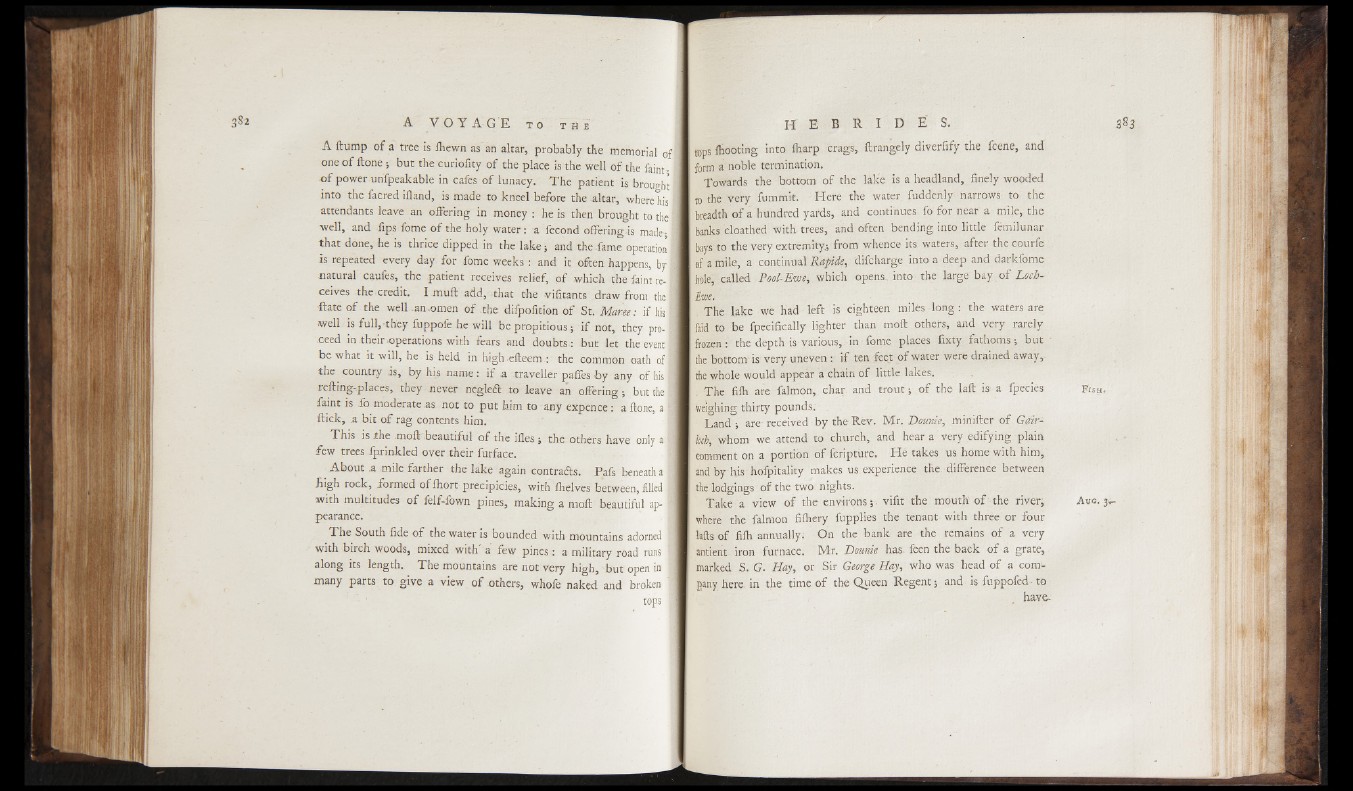
A ftump of a tree is ihewn as an altar, probably the memorial of
one o f ftone ; but the curiofity o f the place is the well of the faint -
o f power unfpeakable in cafes of lunacy. The patient is brought
into the facred ifland, is made to kneel before the altar, where his
attendants leave an offering in money : he is then brought to the I
well,, and ftps fome of the holy water: a fecond offering-is made’, I
that done, he is thrice dipped in the lake; and the fame operation I
is repeated every day for fome weeks : and it often happens, by I
natural caufes, the patient receives relief, pf which the faint re-1
ceives thecredit. I muff add, that the -vifitants draw from the I
Rate of the well an .omen o f the difpofition of St. Mane: if his I
•well is full, they fuppofe he will be propitious- if not, they pro-1
.ceed in their .operations with fears and doubts .; but let the event I
be what it will, he is held in high efteem.: the common oath of I
the country is, by his name: if & traveller paffes by any of his■
refting-places, they never negleft to leave an offering; but the!
faint is fo moderate .as not to put him to any expence: a ftone, a I
ftick, a bit cff rag contents him.
This is the .moft beautiful o f the iiles ; the others have only a I
few trees fprinkled over their furface.
About .a mile farther the lake again contrafts. Pafs beneath a I
frigh rock, formed ofIhort precipicies, with ihelves between, filled I
with multitudes o f felf-fown pines, making a moil beautiful ap-1
pearance.
The South fide o f the water is bounded with mountains adorned I
with birch woods, mixed with a few pines-: a military road runs I
along its length. The mountains are not very high, ' but open in I
many parts to give a view o f others, whofe naked and broken 1
tops I
tops ihooting into iharp crags, ftrangely diverfify the fcene, and
form a noble termination.
Towards the bottom of the lake is a headland, finely wooded
to the very fummit. Here the water, fuddenly narrows to the
br e a dth of a hundred yatds, and continues fo for near a mile, the
Banks cloathed with trees, and often bending into little femilunar
bays to the very extremity; from whence its waters, after the courfe
of a mile, a continual Rapide, difcharge into a deep and darkfome
hole, called Pooh Ewe, which opens, into the large bay of Loch-
Ewe.
The lake we had left is eighteen miles long: the waters are
laid to be fpecifically lighter than moft others, and very rarely
frozen : the depth ls-vanous,. in iome places fixty fathoms; but
the bottom is very uneven : if ten feet of water were drained away,
the whole would appear a chain o f little lakes.
The filh are falmon,. char. and trout; of the laft is-a fpecies F i s h .
weighing thirty pounds: .
Land; are received by the Rev. Mr. Dounie, miniffer o f Gair-
'Uch, whom we attend to church, and hear a very edifying plain
comment on a portion of fcripture. He takes us home with him,
and by his hofpitality makes us experience the. difference between
the lodgings of the two nights.
Take a view of the en v iro n sv ifit the mouth o f the river; A u g . 3»-
where the'falmon fiihery fupplies the tenant with three or four
lafts of fiih annually; On the bank are the remains o f a very
antient iron furnace. Mr. Dounie has. feen the back o f a grate,
marked S. G. Hay, or Sir George Hay, who was head of a company
here, in the time o f the Queen Regent; and is fuppofed- to
have.